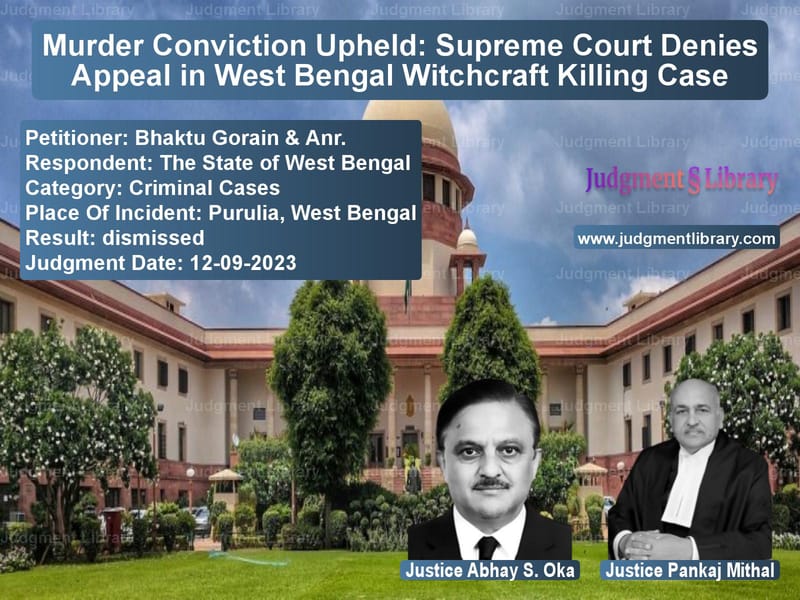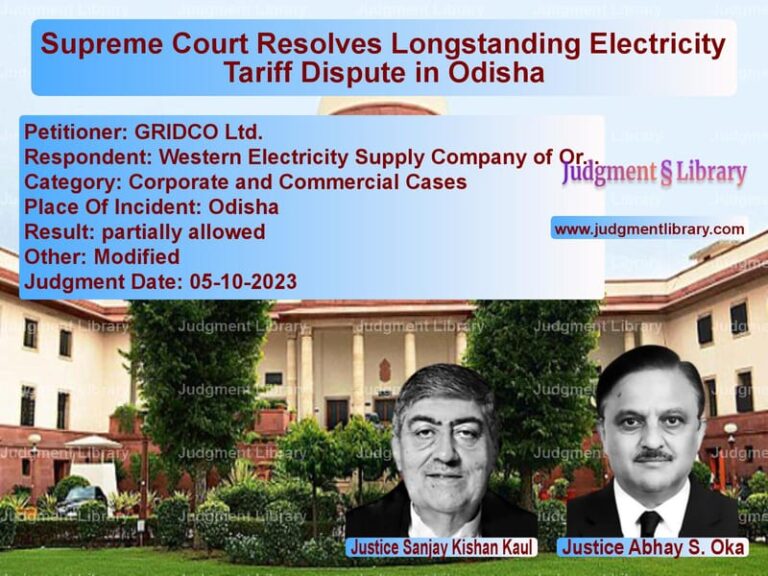Murder Conviction Upheld: Supreme Court Denies Appeal in West Bengal Witchcraft Killing Case
The Supreme Court in Bhaktu Gorain & Anr. vs. The State of West Bengal reaffirmed the life imprisonment sentence of two accused convicted of murder under Section 302 read with Section 34 of the Indian Penal Code (IPC). The case involved the brutal killing of a widow, Smt. Keshari Mahato, in West Bengal, allegedly due to suspicions of witchcraft.
Background of the Case
The case arose from an incident on September 27, 1993, in Purulia, West Bengal. According to the FIR, the deceased, Keshari Mahato, and her daughter-in-law, Bijali Mahato, were returning home after performing their daily ablutions at a pond when they were surrounded and attacked by five accused persons—Bhaktu Gorain (A-1), Surendra Gorain (A-2), Bandhu Gorain (A-3), Ranjit Gorain (A-4), and Rajen Gorain (A-5). The accused were armed with deadly weapons, including a tangi, tabala, and lathi.
Legal Issues Raised
- Whether the prosecution had proven the common intention of all accused in committing the murder.
- Whether the evidence presented, including eyewitness testimonies, was credible and sufficient to sustain the conviction.
- Whether the appellants, Bhaktu Gorain (A-1) and Bandhu Gorain (A-3), could be granted relief based on the duration of their incarceration.
Prosecution’s Arguments
The prosecution relied on the testimonies of multiple eyewitnesses, including the deceased’s sons—Lakshmi Mahato (PW-1), Sudhir Mahato (PW-2), and Rampada Mahato (PW-3)—and her daughter-in-law, Bijali Mahato (PW-4). They all stated that they witnessed the accused surrounding the deceased and attacking her.
Key prosecution points:
- The deceased was branded a witch (diayen) by the accused the previous night.
- The accused pre-planned the attack and executed it with deadly weapons.
- The medical evidence corroborated the nature of the attack, with multiple head injuries caused by sharp and blunt weapons.
- The accused persons were identified in court, and the weapon recovered was linked to the injuries found during the post-mortem.
Defense’s Arguments
The defense contended that:
- The accused did not have the common intention to kill the deceased and merely wanted to warn her against practicing witchcraft.
- There were contradictions in the prosecution’s witnesses’ testimonies.
- The appellants had already served significant jail time and should be granted remission.
Supreme Court’s Findings
The Court rejected the appellants’ arguments and upheld their conviction.
1. Common Intention Established
- The Court noted that the accused had gathered with weapons and acted in furtherance of a pre-planned conspiracy.
- The injuries inflicted on the victim’s head indicated an intention to cause death, ruling out the argument that they only intended to “teach a lesson.”
2. Eyewitness Testimonies Were Consistent
- The Supreme Court found that the testimonies of PW-1, PW-2, PW-3, and PW-4 were consistent and reliable.
- The eyewitnesses were family members of the deceased, but their statements corroborated medical evidence and the FIR.
3. Medical and Forensic Evidence
- The post-mortem report confirmed three fatal injuries, including two deep incised wounds on the head and a fracture on the right forearm.
- The doctor (PW-9) stated that the injuries could have been caused by the tangi and lathi recovered from the crime scene.
4. Consideration of Sentence Duration
- The Court noted that the appellants had already served 15 years and 9 months (Bhaktu Gorain) and 11 years and 7 months (Bandhu Gorain) in jail.
- It directed that the appellants could apply for remission as per the state government’s policies.
Final Judgment
The Supreme Court:
- Dismissed the appeal.
- Reaffirmed the life imprisonment sentence of both appellants.
- Permitted the appellants to apply for remission under the prevailing state government policies.
Impact of the Judgment
This ruling sets a precedent in cases involving accusations of witchcraft and mob violence:
- Affirmation of common intention in group crimes: The Court upheld that when individuals act together with a shared motive, all can be held guilty.
- Protection of vulnerable individuals: The judgment reinforces legal protection against mob justice and superstition-based violence.
- Right to remission: The Court acknowledged the appellants’ right to seek remission but left the decision to the state government.
Conclusion
The Supreme Court’s decision in Bhaktu Gorain & Anr. vs. The State of West Bengal upholds the principles of justice by ensuring that those who participate in planned mob violence cannot escape punishment. While the Court permitted the appellants to seek remission, it made it clear that their conviction was legally sound. The ruling reaffirms the judiciary’s stance against crimes committed under the guise of social beliefs and superstitions.
Petitioner Name: Bhaktu Gorain & Anr..Respondent Name: The State of West Bengal.Judgment By: Justice Abhay S. Oka, Justice Pankaj Mithal.Place Of Incident: Purulia, West Bengal.Judgment Date: 12-09-2023.
Don’t miss out on the full details! Download the complete judgment in PDF format below and gain valuable insights instantly!
Download Judgment: bhaktu-gorain-&-anr.-vs-the-state-of-west-be-supreme-court-of-india-judgment-dated-12-09-2023.pdf
Directly Download Judgment: Directly download this Judgment
See all petitions in Murder Cases
See all petitions in Bail and Anticipatory Bail
See all petitions in Custodial Deaths and Police Misconduct
See all petitions in Judgment by Abhay S. Oka
See all petitions in Judgment by Pankaj Mithal
See all petitions in dismissed
See all petitions in supreme court of India judgments September 2023
See all petitions in 2023 judgments
See all posts in Criminal Cases Category
See all allowed petitions in Criminal Cases Category
See all Dismissed petitions in Criminal Cases Category
See all partially allowed petitions in Criminal Cases Category







